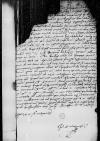List #1871
Ioannes DANTISCUS do [Tiedemann GIESE]Hohenstein (Olsztynek), 1538-07-12
Regest polski:
Dantyszek opuścił Wrocław 18 [czerwca], 19 zaś król [Ferdynand I Habsburg] wyruszył stamtąd w kierunku Ołomuńca. Od 27 [czerwca] do 1 [lipca] Dantyszek przebywał w Krakowie, gdzie załatwił sprawy, powierzone mu listownie przez Giesego.
4 [lipca] para królewska [Zygmunt I i Bona Sforza] odprowadziła do Bochni młodego króla [Zygmunta II Augusta] udającego się na wojnę z "Wołochem" [Piotrem Rareșem].
Georg Hegel utrzymuje, że bulle [konfirmacyjne] zostały wysłane do Dantyszka i Giesego 9 kwietnia. Nie zna powodu, dla którego są tak długo w drodze. Dantyszek podejrzewa, że ich niedoręczeniu winien jest Dietrich von Rheden, który pragnie dostarczyć je osobiście, czego jednak Dantyszek nie poczytuje mu za zasługę.
Hegel bezzwłocznie wyśle Dantyszkowi rachunek, który nadesłać ma [z Rzymu] Quirinus Galler, a także dokument objęcia zarządu nad biskupstwem, który Samuel Maciejowski obiecał przekazać, gdy tylko król otrzyma decyzję papieża [Pawła III] w sprawie Giesego.
Z Krakowa Dantyszek wracał krótszą drogą przez Mazowsze, dlatego nie wstąpił z wizytą.
Rękopiśmienne podstawy źródłowe:
Publikacje:
| ||||||
Tekst + aparat krytyczny + komentarzZwykły tekstTekst + komentarzTekst + aparat krytyczny
[...] paper damaged⌈[...][...] paper damaged⌉ carissi paper damaged⌈[carissi]carissi paper damaged⌉me et honoran(de) or honoran(dissime)⌈honoran(de)honoran(de) or honoran(dissime)⌉.
Salutem paper damaged⌈[tem]tem paper damaged⌉ [...] paper damaged⌈[...][...] paper damaged⌉ commendationem paper damaged⌈[commendationem]commendationem paper damaged⌉ plurimam.
Sospes Deo gratia paper damaged⌈[ratia]ratia paper damaged⌉
[...] paper damaged⌈[...][...] paper damaged⌉ibus feliciter ampliusque quam ex s[...] paper damaged⌈[...][...] paper damaged⌉ [...] paper damaged⌈[...][...] paper damaged⌉ibus paulo post ex hoc satis lon[...] paper damaged⌈[...][...] paper damaged⌉s viribus, latius ingressus sum cum [...] paper damaged⌈[...][...] paper damaged⌉ magnifico domino
De bullis nostris mihi
Lucratus sum intereundum per
Quam felicissime valere cupio ex animo.
Dat(ae) or Dat(um)⌈Dat(ae)Dat(ae) or Dat(um)⌉
Reverendissimae Dominationis Vestrae frater integerrimus

 BCz, 245, p. 37
BCz, 245, p. 37